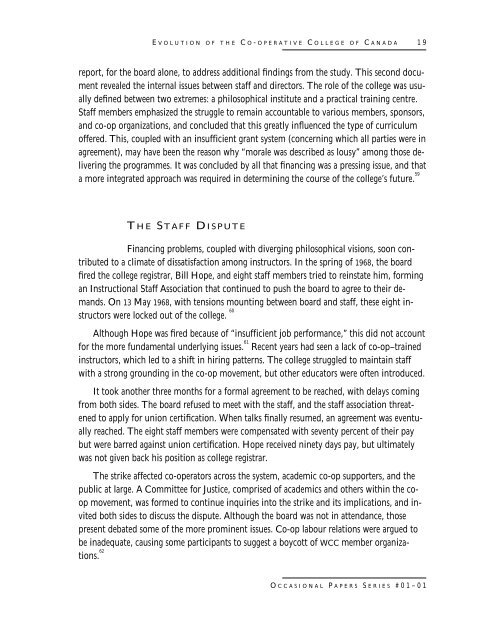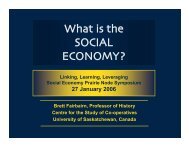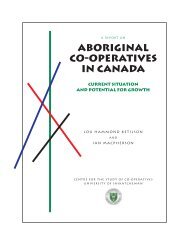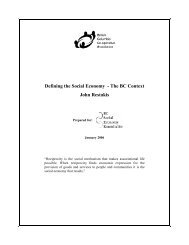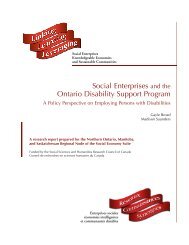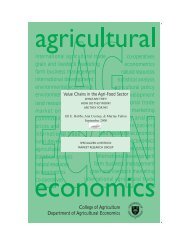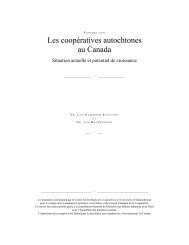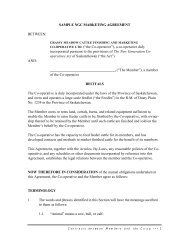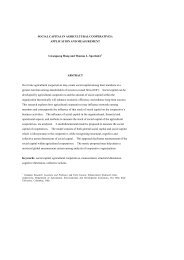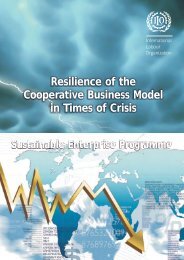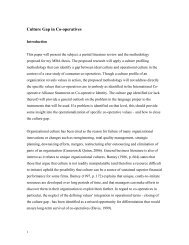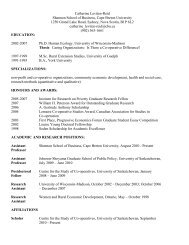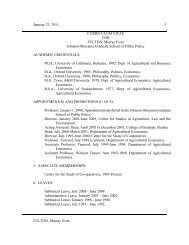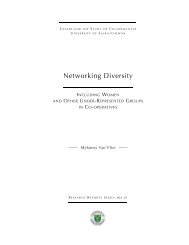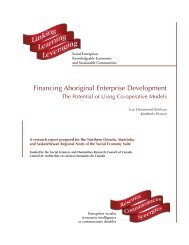Co-op College History - Centre for the Study of Co-operatives
Co-op College History - Centre for the Study of Co-operatives
Co-op College History - Centre for the Study of Co-operatives
You also want an ePaper? Increase the reach of your titles
YUMPU automatically turns print PDFs into web optimized ePapers that Google loves.
E VOLUTION OF THE C O - OPERATIVE C OLLEGE OF C ANADA 19<br />
report, <strong>for</strong> <strong>the</strong> board alone, to address additional findings from <strong>the</strong> study. This second document<br />
revealed <strong>the</strong> internal issues between staff and directors. The role <strong>of</strong> <strong>the</strong> college was usually<br />
defined between two extremes: a philos<strong>op</strong>hical institute and a practical training centre.<br />
Staff members emphasized <strong>the</strong> struggle to remain accountable to various members, sponsors,<br />
and co-<strong>op</strong> organizations, and concluded that this greatly influenced <strong>the</strong> type <strong>of</strong> curriculum<br />
<strong>of</strong>fered. This, coupled with an insufficient grant system (concerning which all parties were in<br />
agreement), may have been <strong>the</strong> reason why “morale was described as lousy” among those delivering<br />
<strong>the</strong> programmes. It was concluded by all that financing was a pressing issue, and that<br />
a more integrated approach was required in determining <strong>the</strong> course <strong>of</strong> <strong>the</strong> college’s future. 59<br />
T HE S TAFF D ISPUTE<br />
Financing problems, coupled with diverging philos<strong>op</strong>hical visions, soon contributed<br />
to a climate <strong>of</strong> dissatisfaction among instructors. In <strong>the</strong> spring <strong>of</strong> 1968, <strong>the</strong> board<br />
fired <strong>the</strong> college registrar, Bill H<strong>op</strong>e, and eight staff members tried to reinstate him, <strong>for</strong>ming<br />
an Instructional Staff Association that continued to push <strong>the</strong> board to agree to <strong>the</strong>ir demands.<br />
On 13 May 1968, with tensions mounting between board and staff, <strong>the</strong>se eight instructors<br />
were locked out <strong>of</strong> <strong>the</strong> college. 60<br />
Although H<strong>op</strong>e was fired because <strong>of</strong> “insufficient job per<strong>for</strong>mance,” this did not account<br />
<strong>for</strong> <strong>the</strong> more fundamental underlying issues. 61 Recent years had seen a lack <strong>of</strong> co-<strong>op</strong>–trained<br />
instructors, which led to a shift in hiring patterns. The college struggled to maintain staff<br />
with a strong grounding in <strong>the</strong> co-<strong>op</strong> movement, but o<strong>the</strong>r educators were <strong>of</strong>ten introduced.<br />
It took ano<strong>the</strong>r three months <strong>for</strong> a <strong>for</strong>mal agreement to be reached, with delays coming<br />
from both sides. The board refused to meet with <strong>the</strong> staff, and <strong>the</strong> staff association threatened<br />
to apply <strong>for</strong> union certification. When talks finally resumed, an agreement was eventually<br />
reached. The eight staff members were compensated with seventy percent <strong>of</strong> <strong>the</strong>ir pay<br />
but were barred against union certification. H<strong>op</strong>e received ninety days pay, but ultimately<br />
was not given back his position as college registrar.<br />
The strike affected co-<strong>op</strong>erators across <strong>the</strong> system, academic co-<strong>op</strong> supporters, and <strong>the</strong><br />
public at large. A <strong>Co</strong>mmittee <strong>for</strong> Justice, comprised <strong>of</strong> academics and o<strong>the</strong>rs within <strong>the</strong> co<strong>op</strong><br />
movement, was <strong>for</strong>med to continue inquiries into <strong>the</strong> strike and its implications, and invited<br />
both sides to discuss <strong>the</strong> dispute. Although <strong>the</strong> board was not in attendance, those<br />
present debated some <strong>of</strong> <strong>the</strong> more prominent issues. <strong>Co</strong>-<strong>op</strong> labour relations were argued to<br />
be inadequate, causing some participants to suggest a boycott <strong>of</strong> WCC member organizations.<br />
62<br />
O CCASIONAL P APERS S ERIES #01–01


